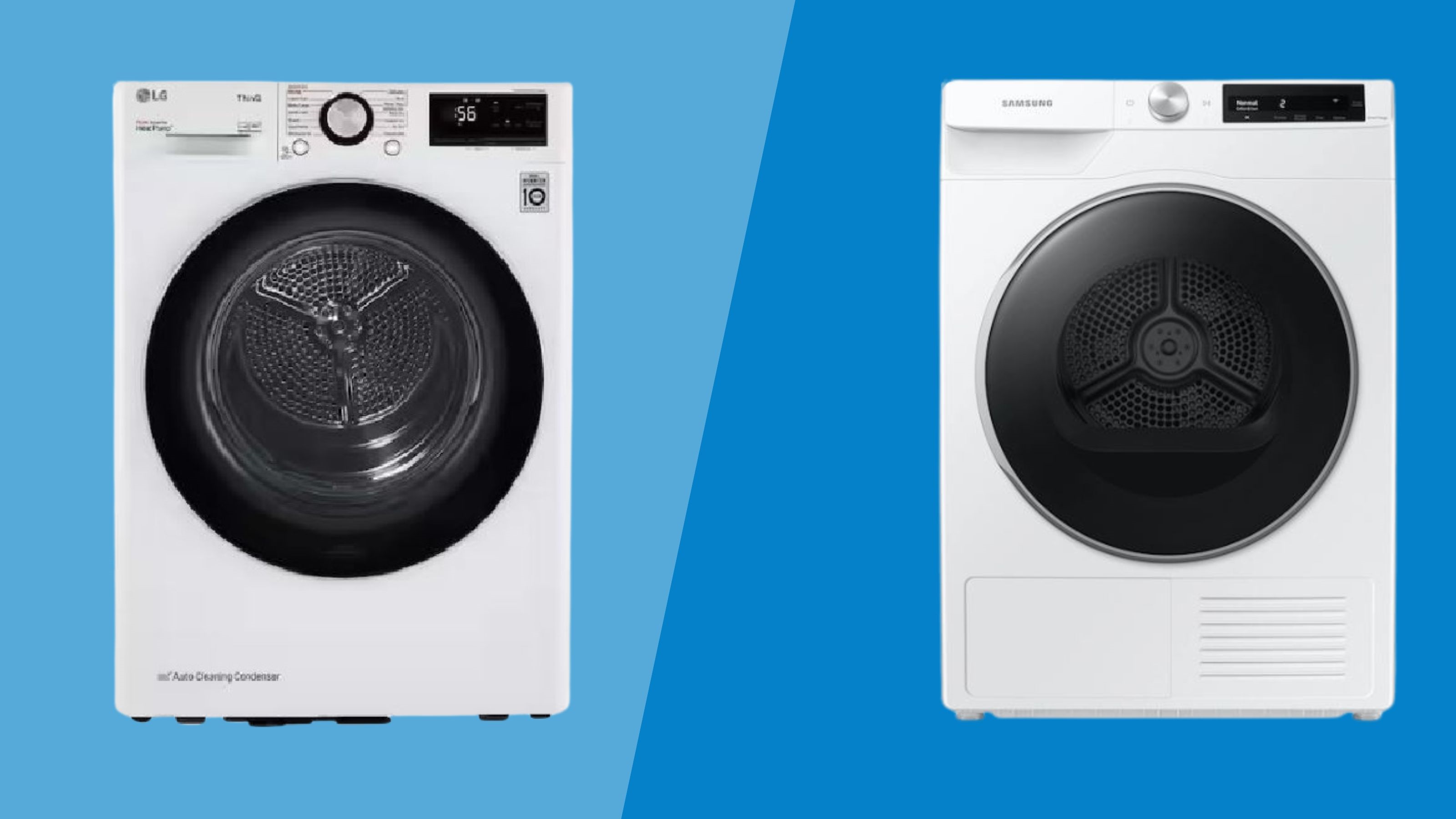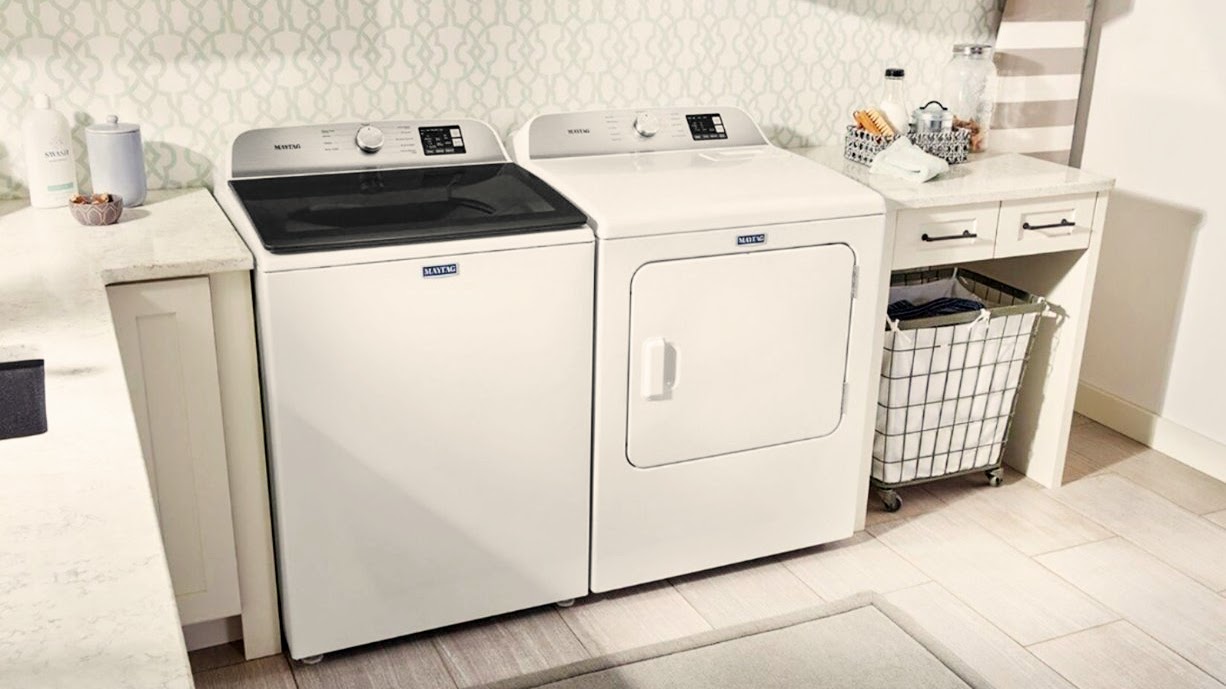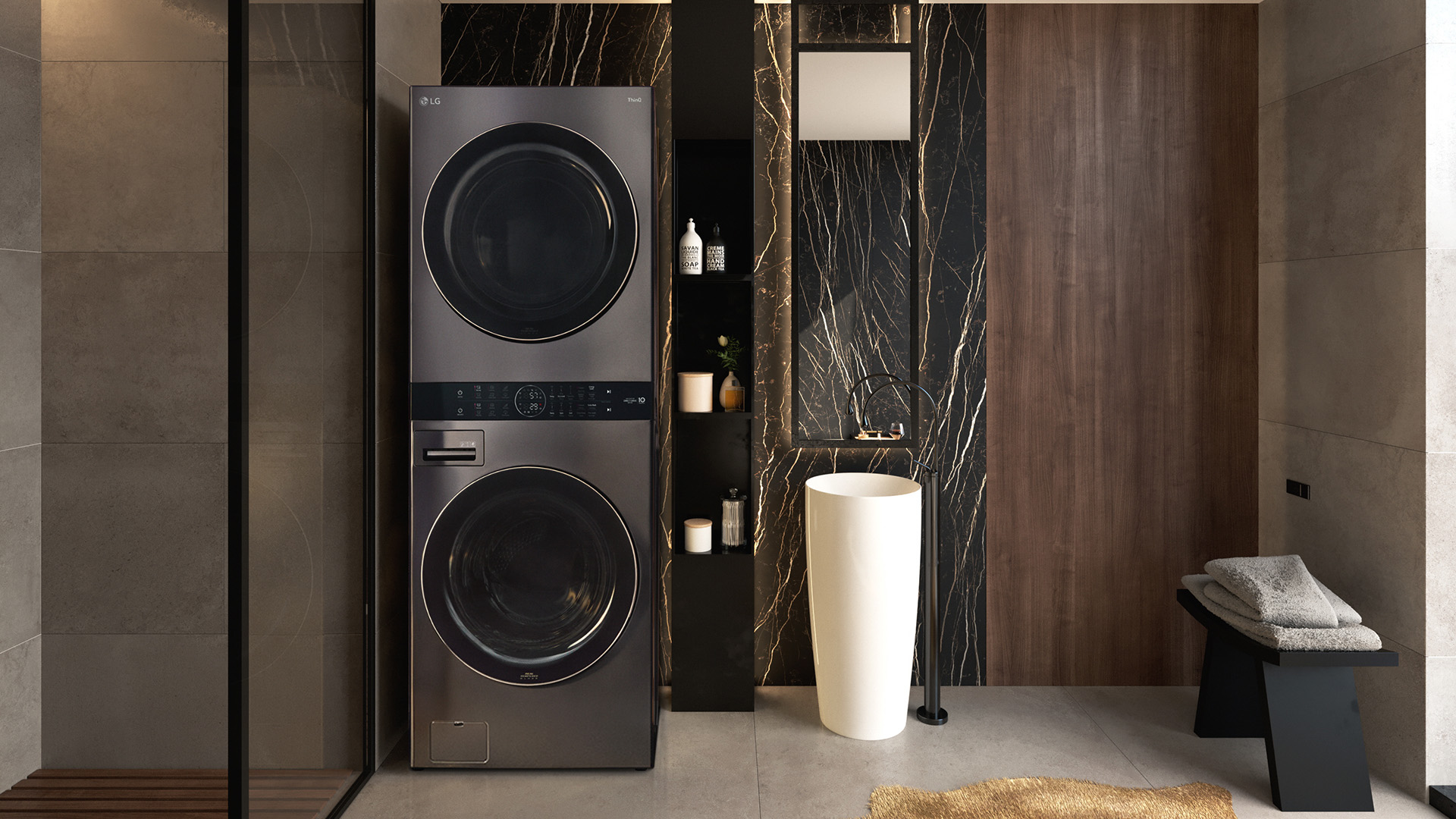
Type: Front load electric ventless
Capacity: 4.2 Cu. Ft.
Cycles: 14
Features: Sensor dry, lint filter
Warranty: 1 year parts and labor, 3 year drum
The LG 24 in. W 4.2 Cu. Ft. Ventless Stackable Compact SMART Electric Dryer has a good drying capacity and plenty of drying cycles to choose from. It can also connect to the LG ThinQ app which means that you can start the laundry while you're out and receive update notifications. Connect to Alexa for voice control.
For
- Decent capacity
- ENERGY STAR certified
- WiFi connectivity
Against
- Stacking kit not included
- 3-hour drying time may be too long for some households
Type: Front load electric heat pump
Capacity: 4.0 cu. ft.
Cycles: 12
Features: AI Smart Dial, Sensor Dry, WiFi, reversible door, child lock
Warranty: 1 year (parts and labor)
The Samsung DV25B6900HW/A2 Heat Pump is an incredibly energy-efficient and cost-effective. With 12 preset drying cycles, WiFi connectivity and Sensor Dry to automatically optimizes the time and temperature of the cycle, it's a fantastic machine.
For
- Compact design
- ENERGY STAR certified
- WiFi connectivity
Against
- Stacking kit not included
- Might be too small for larger households
When it comes to drying your laundry, there are multiple appliances that can do the job, all with varying results. So when you're looking for one of the best dryers, what's the difference between a condenser dryer vs heat pump?
As with all machines, the answer will in part depend on your household size, budget, cleaning needs and personal preferences. But there are pros and cons to both, so I spoke to the experts to find out more. In this article I'll take you through the key differences in price, design, features, power and size so you can make an informed buying decision.
Condenser dryers vs heat pump: What's the difference?
"A condenser dryer is a clothes dryer that dries laundry by heating air, passing it through the clothes, and then cooling the warm, moist air to condense the moisture into water," explains tech expert Panayot Kalinov. "This water is collected in a container or drained away through a hose. The cooled, dry air is then reheated and circulated back through the drum to continue the drying process. This type of dryer doesn’t require an external vent, making it a popular choice in places where venting is difficult or not possible.
"Meanwhile, a heat pump is a device that moves heat from one place to another using a small amount of energy. In the context of clothes dryers, a heat pump dryer uses a refrigeration system to pull heat from the surrounding air and use it to dry clothes.
"The warm, moist air is passed over a cold coil, where the moisture condenses and is collected. The dry air is then reheated and sent back into the drum. This method is highly energy-efficient and is considered more eco-friendly compared to traditional drying methods."
The key difference between condenser dryers, aka ventless dryers, and heat pump dryers lies in how they dry clothes and their energy use.
Kalinov says: "Condenser dryers use a heating element to warm the air and then cool it to remove moisture, while heat pump dryers use a refrigeration cycle to recycle the heat for drying.
"Because of this, heat pump dryers are much more energy-efficient, often using less than half the energy of a condenser dryer. However, heat pump dryers tend to have longer drying cycles and are generally more expensive upfront.
"On the other hand, condenser dryers are quicker but less energy-efficient and might be harsher on clothes due to higher drying temperatures."
Of course there are pros and cons to both appliance, says Arne Helgesen, CTO at Sharecatand a seasoned tech expert. "Condenser dryers collect water and expel heat, while heat pump dryers recirculate warm air, making them more energy-efficient. Heat pump dryers also usually operate at lower temperatures, which can be gentler on fabrics."
He told TopTenReviews: "Condenser dryers tend to be less expensive upfront and dry clothes more quickly. They’re also more compact and versatile in terms of installation. However, they consume more energy and can be harsher on fabrics due to higher heat. Additionally, they may increase the humidity in the room.
"By contrast, heat pump dryers are very energy-efficient and gentle on clothes, making them a good option for a variety of environments. They don’t increase room humidity, but they are more expensive to buy initially, take longer to dry clothes, and can be larger and heavier than condenser dryers."
Condenser dryers vs heat pump: Price
Condenser dryers are generally cheaper than heat pump dryers.
For a basic condenser dryer, like the Magic Chef 4.0 cu. ft. ventless Condensing Front Load Stackable Electric Dryer on Home Depot, prices usually range from $400 to $600, Kalinov told TopTenReviews. "A mid-range model might cost between $600 and $900 (like the LG Ventless Heat Pump 4.2-cu ft Stackable Ventless Smart Electric Dryer on Lowe's), and luxury models can go from $900 to $1,500.
"Heat pump dryers are more expensive, with basic models starting around $700 to $1,000. Mid-range heat pump dryers usually cost between $1,000 and $1,500, and luxury models can go from $1,500 to $2,500 or even higher (like the Samsung Bespoke 7.8 cu. ft. Ultra Capacity Electric Ventless Hybrid Heat Pump Dryer with AI Optimal Dry). Though heat pump dryers cost more upfront, their energy efficiency can lead to savings over time that might offset the initial price difference."
Verdict: Condenser dryers tend to be cheaper than heat pumps but they are also lacking in features.
Condenser dryers vs heat pump: Design & Features
Both condenser and heat pump dryers look similar, with a drum to tumble clothes.
But Kalinov explains: "Heat pump dryers often have more advanced features due to their newer technology. They might come with more precise temperature controls, smart features like Wi-Fi connectivity, and more specialized cycles for delicate fabrics.
"Condenser dryers, while generally simpler, can still come with useful features like multiple drying programs, timed drying, and anti-crease functions. In terms of look, both types are available in a variety of designs and finishes to suit different tastes and home styles."
Helgesen adds: "Heat pump dryers also tend to have larger capacities and more precise temperature control."
Verdict: Heat pumps tend to be more feature-rich, but they are also more expensive.

Condenser dryers vs heat pump: Power & Size
Condenser dryers usually use more power, typically ranging from 2000 to 3000 watts. Heat pump dryers, being more energy-efficient, generally operate between 600 to 1000 watts, said Kalinov.
He says: "Size-wise, both types are pretty similar, usually around 24 inches wide, 33-35 inches tall, and 25-28 inches deep. Sometimes, heat pump dryers may be slightly larger due to the extra components needed for the heat pump system. Despite the lower power usage, heat pump dryers often take longer to dry clothes. But the energy savings can be significant over time, even though both types should fit into spaces designed for standard dryers."
Verdict: Both appliances are similar in size but condenser dryers use more power, and heat pumps are more energy efficient.
Condenser dryers vs heat pump: Our verdict
Choosing between a condenser dryer and heat pump will depend on your the size of your household, budget and drying needs.
He says: "When comparing the two, heat pump dryers generally come out ahead for most people. Their main advantage is energy efficiency, which not only saves money on electricity but also reduces the environmental impact.
"They’re gentler on clothes, which helps them last longer, and they often come with more advanced features. Although they cost more upfront, the energy savings can make up for this over time. However, if you’re on a tight budget or need faster drying times, a condenser dryer might be a better choice.
"Overall, heat pump dryers are more future-proof and eco-friendly, making them the better option if you can afford the initial cost and don’t mind the longer drying times."

Condenser dryers vs heat pump: FAQs
Which is better: heat pump or condenser dryer?
Compared with a heat pump, a condenser dryer can be expensive and isn't as energy efficient. This is because heat pump tumble dryers use a closed-loop heat exchange system to dry clothes at a lower temperature, keeping energy usage low and providing better protection for your laundry.
Both types of dryers are constantly improving with new technology. Some models now include steam functions that help reduce wrinkles, sanitize clothes, or freshen up garments, says Kalinov.
"There’s also been progress in making condenser dryers more energy-efficient, which narrows the gap between the two. Local factors like energy costs, climate, and available space can also influence your choice. In areas where electricity is expensive, the savings from a heat pump dryer become even more valuable. Some places might offer rebates or incentives for buying energy-efficient appliances like heat pump dryers, which could affect the overall cost comparison.
"Lastly, consider the expected lifespan, warranty, and availability of local repair services when choosing between these two types of dryers."
Which is cheaper to run: heat pump or condenser?
The most energy-efficient tumble dryers, and cheapest to run, are heat pump tumble dryers.







